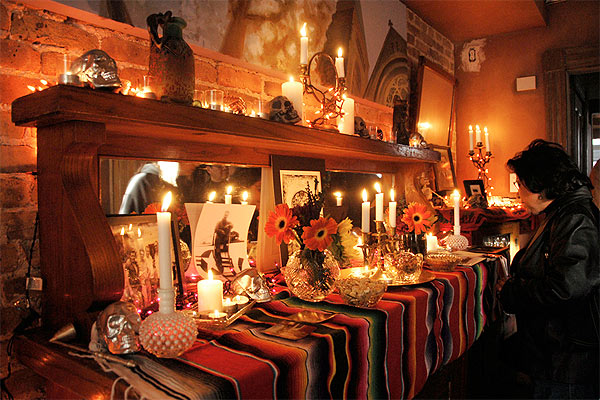
When artist Linda Beierle Bullen built her first altar nearly a decade ago to memorialize the life of her mother-in-law, she never imagined that it would become an annual tradition in her Pullman neighborhood. The altars—often adorned with colorful flowers, photographs, and candles—are customarily constructed for the Mexican holiday Día de los Muertos (Day of the Dead), which coincides with the Catholic observance of All Souls' and All Saints' Day on November 1st and 2nd.
Beierle Bullen embraced the altar-making tradition as a way to engage her community in Pullman, a historic industrial town that was recently named one of 2011’s Great Places in America by the American Planning Association. In 2005, Pullman held the first Día de los Muertos celebration at the Hotel Florence.
This year, Pullman State Historic Site—where Beierle Bullen serves as curator—is partnering with Chicago Artists Month to host and publicize what is now called the Pullman Día de los Muertos Altar Walk. The revamped self-guided tour will take visitors into private homes to view altars made by residents and artists including Christopher Campagna, Dana Day, and Donnie Stahlke.
Beierle Bullen hopes the publicity from Chicago Artists Month—a city-sponsored initiative—will attract a new audience to her tight-knit far South Side community, which sustains its own groups of beekeepers, urban gardeners, and historians.
“A lot of people really are kind of frightened of the far South Side, and there really isn’t any need to be. Our neighborhood in particular is very safe and it’s very unique,” said Beierle Bullen, who was raised in Wrigleyville and moved to Pullman from Rogers Park 11 years ago after completing her master’s degree at School of the Art Institute of Chicago.
“In more recent years, a lot of the old-timers’ families who were born here, whose fathers or grandfathers worked for [railroad industrialist] George Pullman, are beginning to die off,” Beierle Bullen said, noting an influx of young artists who now call the neighborhood home due to its affordable housing, safe streets, and proximity to the 111th St. Metra and I-94.
Proceeds from the altar walk will benefit the $3.5-million renovation of the 1881-era Hotel Florence, where Pullman’s Día de los Muertos tradition first began.
GO: Annual Pullman Día de los Muertos Altar Walk, 10/30 at 4. $10–$15. Meet at 619 E. 111th St. pullman-museum.org
RELATED: Chicago Guide »
Photography: Tony Dzik/Courtesy of Pullman State Historic Site


